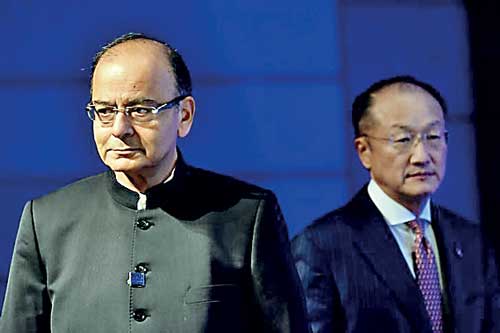Saturday Feb 28, 2026
Saturday Feb 28, 2026
Wednesday, 21 December 2016 00:00 - - {{hitsCtrl.values.hits}}
Reuters: India will offer tax incentives to small businesses engaged in cashless transactions, Finance Minister Arun Jaitley told reporters on Tuesday, as part of the government’s fight against the cash economy.
Jaitley said the move would enable businesses with annual turnover of 20 million rupees ($294,000) to save up to 30% in tax payments .
.
Since Prime Minister Narendra Modi’s shock move last month to scrap old 500 and 1,000 rupee notes, New Delhi has taken a raft of measures to encourage cashless transactions.
Earlier this month, it announced incentives including discounts of between 0.75% to 10% on digital payments for purchases of petrol, diesel and insurance products from state-run companies. The government last week also unveiled two lucky draw schemes to reward poor and middle-class consumers and small businesses for conducting cashless transactions.
Modi’s shock currency replacement programme is aimed at flushing out cash earned through illegal activities, or earned legally but never disclosed.
However, the decision has sucked 86% of India’s currency out of circulation, leaving companies, farmers and households all suffering. Nine in 10 Indians live in the cash economy and many lack the smartphones and bank accounts they need to go cashless.
Reuters: Pakistan’s Senate has recommended scrapping of the 5,000 rupee ($48) banknote, despite government opposition and warnings that removal of the country’s highest denomination bill could destabilise the economy.
A resolution, which is not binding, called for the government to remove the banknote to “reduce illicit money flow, encourage the use of bank accounts and reduce the size of undocumented economy”.
The resolution, passed on Monday, comes less than two months after Indian Prime Minister Narendra Modi surprisingly scrapped his country’s two biggest currency bills – the 1,000 rupee ($15) and 500 rupee notes - in a move that led to acute currency shortages and threatens to slow India’s short-term economic growth.
Senator Osman Saifullah Khan, who proposed the motion, wants the banknote to be scrapped over a three- to five-year period, domestic media said.
Pakistan has a huge informal economy and transactions are often handled in cash, partly because much of the population is not part of formal sectors. The government also offers frequent tax amnesties to encourage people with hidden wealth to declare their assets, hoping to expand Pakistan’s extremely narrow tax base.